Biographies of Our Forefathers
JOSEPH RICHARD TINNENY
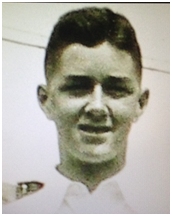
Joseph R. Tinneny was the third son and fifth child
of James J. Tinneny and Gertrude A. Spence. He was born in the
family home at 4724 Fowler Street in Philadelphia, Pennsylvania on
March 25, 1917. Joe was baptized at Holy Family Church.
|
He attended Holy Family Grade School on Hermitage
Street and Saint John the Baptist Boys High School from which he
graduated in in the Class of 1935. He was a member of the school’s
running team and a pole-vaulter. He
also played an instrument in the school band and was a substitute on
the football team. His brother Donald recalled that Joe would
frequently throw his hip out of place while pole vaulting. Years
later Joe attributed an enlarged heart to his long distance running
in his youth. Like his father and several of his brother’s, Joe was
an avid reader of books from an early age.
Photo: Joe’s high school class ring given to Rich
Tinneny in 1974. |
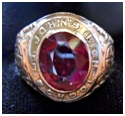 |
Following graduation from high school Joe found work
as a timekeeper with the SKF Ball and Roller Bearing Company in
Philadelphia. Meantime,
on September 16, 1940, the United States had instituted the
Selective Training and Service Act of 1940, which required all men
between the ages of 21 and 45 to register for the draft. This was
the first peacetime draft in United States' history. Those who were
selected from the draft lottery were required to serve at least one
year in the armed forces. Once the U.S. entered WWII, draft terms
extended through the duration of the fighting. As
was his duty to do, he registered for the draft on October 16, 1940.
At the time he was living with his parents at 4139 Pechin Street in
Philadelphia.
Draft Registration Form completed October 16, 1940.
|
Joe’s number came up in the draft lottery and he was
enlisted in the United States Army October 23, 1941 at Camp Lee,
Virginia and assigned serial number 33129099. At the time the United
States was not at war and Joe had no idea that what was to be a one
year service commitment would result in him spending the next 11 month in the United States and 35 months in Europe during
World War II.
He trained at
MacDill Army Air Field.
A major mission for MacDill was the training of aircrews for
overseas deployments, with the first units trained at the base
being Boeing B-17 Flying Fortress heavy bomber groups. Following
training as a medic he was shipped to an Army Air Corps combat
unit England where he served as a medic for the duration of the
war.
On November 24, 1941 Joe’s brother John and his wife
Helen had their first child Richard. They asked Joe and his sister
Clare to serve as Richard’s godparents. The christening went off as
scheduled on December 7th 1941. That evening, as the family was
gathered for dinner and the christening celebration in the home of
Joe’s parents on Pechin Street, a message came over the radio for
all military personnel to report to the nearest military
installation. Subsequent announcements informed the Tinnenys
gathered for the celebration, and the rest of the nation, of the
attack on the American fleet at Pearl Harbor, Hawaii by the Japanese
and the United States entry into World War II.
Joe left the gathering and reported as ordered.
After completing his medical training he was assigned as a medic
with the 8th Air Force at Bury Saint Edmund, England.
Bury Saint Edmund was an airfield on the eastern outskirts of the
town of Rougham, England. It was the mission of the American and
British forces assigned to that base to bomb the Axis forces and
mainland Germany. There were approximately 3000 troops there
billeted in Nissan huts and other temporary facilities. Joe served as a medic,
with the 94th Bomb Group, 322 squadron which flew B-26
Marauders and B-17s. He said that the bombing missions went on
around the clock and that it was so intense that the sky would be
black with the aircraft. As a medic, a major part of his job was to
help recover injured and dead crewmen who returned to the base
aboard the bombers after the raids.
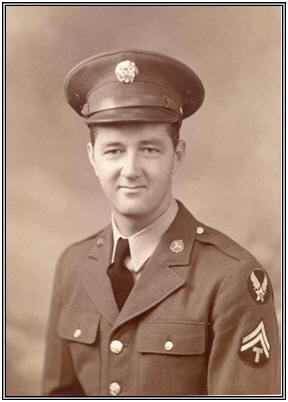
Years later he would recall that he was constantly
amazed at how damaged a plane could be and still fly. He said that
many of the planes returned so shot-up, with major parts shot away,
that they really shouldn’t have been able to remain airborne. Many
of them crash-landed as they approached the airfield. He was
similarly amazed at the degree of damage that the human body could
take as evidenced by the devastation that he saw from the returning
airmen who were his patients.
While in England, Joe rose to the rank of Technical Sergeant. On
one occasion he was courts martialed for calling president Franklin
D. Roosevelt, The Commander in Chief, a “son of a bitch.” Roosevelt
was anathema in the James J. Tinneny Sr. home in Philadelphia so it
shouldn’t have been a surprise that Joe like his father disliked him
intensely. He apparently got into some sort of a discussion or
argument in
which he addressed Roosevelt’s lineage as described
above. Since Roosevelt was also Commander in Chief of the armed
forces it was a violation of military law to speak despairingly of
him. The matter was brought to the attention of Joe’s commanding
officer and Joe was brought before a military court. At the courts
martial he was asked to retract the statement, which he refused to
do. He then went one step further and restated the offending
comment. For his actions he was reduced in grade. However, he soon
got his stripes back and at the end of the war he was discharged as
a Sergeant.
While stationed in England, Joe had the opportunity
to host his brother Bruce on several occasions. Bruce was in the
Navy assigned as a US Navy gunner on the merchant ships that were
engaged in what was called the Murmansk Run i.e. bringing supplies
from America to the Russian City of Murmansk. On
several occasions Bruce was given leave which he took in England
visiting Joe.
|
|
Normally medics are not permitted to carry
weapons. During one of Bruce’s visits for some reason the medics in
Joe’s unit had just been authorized to carry sidearms. Joe, Bruce
and some of their friends went into the town drinking and Joe had
his weapon with him. The local population was scandalized when on
their way back to the base Joe was shooting his gun.
On another occasion Bruce and some of his shipmates
visited Joe for a couple of days. They went out drinking one night at
one of Joe’s favorite pubs. That night Bruce
and his buddies got into a brawl, which resulted in extensive damage
to the pub. Needless to say, Joe was not happy about the incident.
Bruce Tinneny, United States Navy, WWII. He was a
gunner aboard two merchant vessels sunk in the North Atlantic.
|
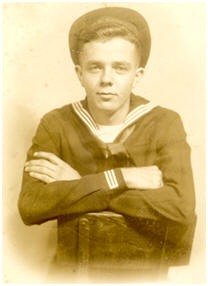 |
|
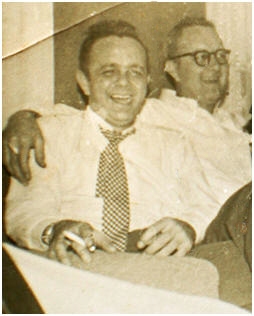 |
Throughout their lives Joe and Bruce
continued to enjoy themselves when they got together.
|
|
In late 1944 the 94th Bomb Group at Rougham held
a 200th Mission Party, which Joe would have attended. The Army
Air Force band, usually led by Glenn Miller, showed up with
singer Dinah Shore, however, Glen Miller was not with them. Ray
McKinley led the musicians and “the audience was swollen by army
girls, civilians and other folk, dancing on the concrete floor
of the main hangar and a good time was held by all.”
|
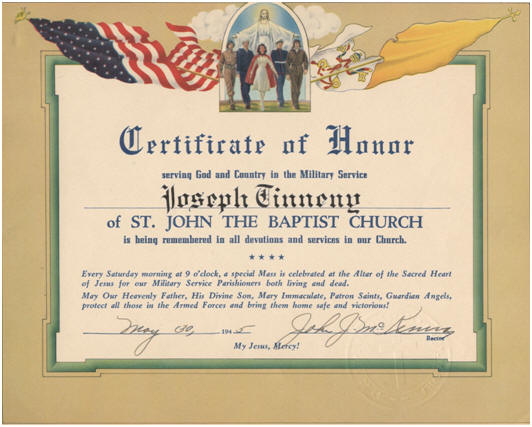
Certificate with seal, sent to Joe by Monsignor John J.
McKenna, Rector of Saint John the Baptist Catholic
Church, Manayunk informing him of the spiritual support
of the parishioners.
Having served throughout the entire war, Joe returned to the
United States aboard the Queen Mary arriving in New York Harbor
September 28, 1945. From there he was assigned to
Separation Center #45, Indian Town Gap Military Reservation,
Pennsylvania from which he was discharged on October 11, 1945.
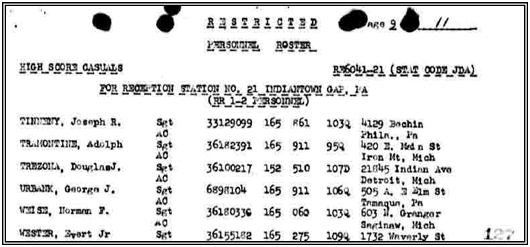
Joe returned from Europe aboard the
Queen Mary. Extract from the personnel roster of the
arriving troops in New York aboard the Queen Mary in
1945.
After the war, Joe was discharged in the grade of
sergeant and among his military decorations were seven battle
stars representing the major battles that he had participated in
during the European campaign. He returned to Philadelphia and
for a time lived with his parents.
In 1950, he applied for the Veterans Compensation
Program established by the State of Pennsylvania.
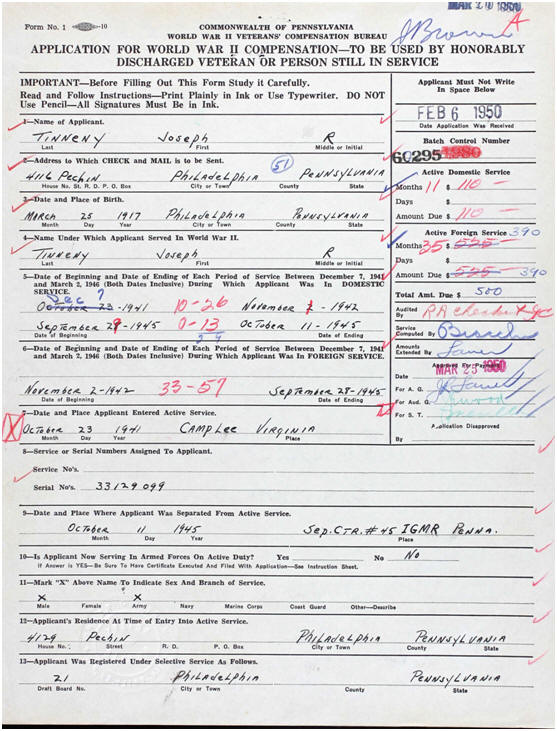
Pennsylvania Application for WWII Compensation
submitted January 17, 1950, P 1.
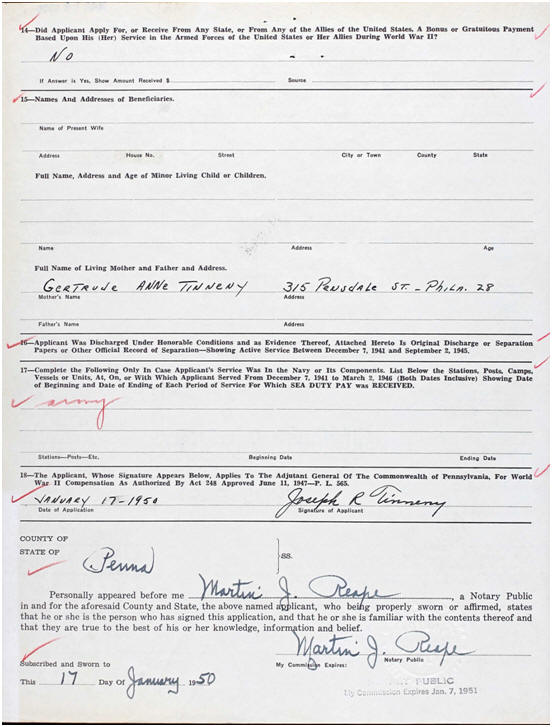
Pennsylvania Application for WWII Compensation,
p.2.
Memorials to the members of the 94th
Bomb Group, which included Joe's Squadron the 332nd, on the
grounds of the former Rougham Air Field – A.A.F. Station 468.
The site was visited by Joe’s godson Richard Tinneny when he was
stationed with the U.S. Air Force in Europe.
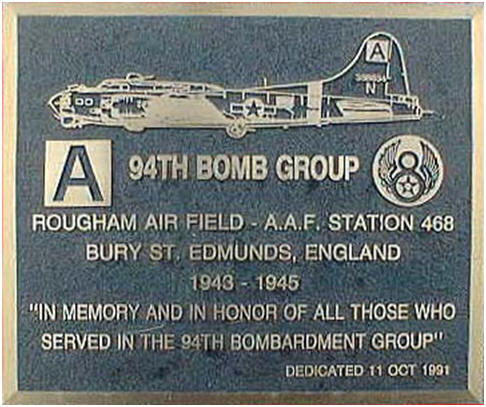
Bronze plaque honoring those who served
with the 94th Bomb Group at Bury Saint
Edmunds during World War II.1991.
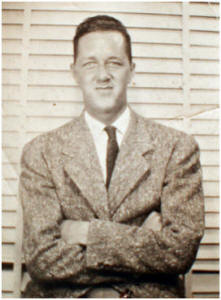
Returning
to civilian life he worked for the Board of Revision of
Taxes of the City of Philadelphia. When the City
administration changed from Republican to Democrat in the
early 1950s, Joe left his job with the City. Bob Hamilton, the local Republican ward
leader, helped him get a job as a purchasing agent with the
construction firm of Conduit and Foundation.
When Joe returned home after the war, he and
his youngest brother Donald developed a very close bond.
After their father past away, Joe and Donald lived with
their mother in a second floor apartment at 4116 Pechin
Street across from their parents former home, both were
thought to be confirmed bachelors and spent a lot of time in
the Manayunk club.
|
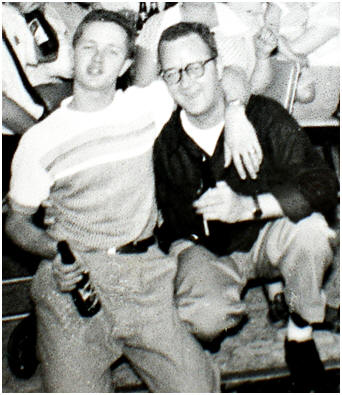 |
Photo Left: Donald and Joe enjoying themselves at
a family event at their brother Jack’s home.
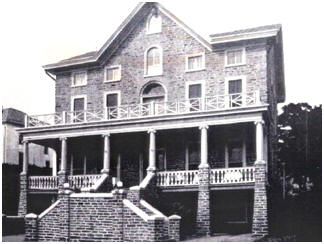
Photo Above: The Manayunk Club a
favoritehangout of the Tinneny siblings and venue
for family weddings in the 1940s and 50s.From
Scribe.org.
|
During the summers the two bachelors spent
vacations and most weekend at the Jersey shore where they enjoy
the sun, the beach and a great social life. After Joe married
Don remained in the apartment. Sometime later, Joe and Betty
bought their home in Conshohocken and Don moved in with then
until he married.
In the 1950s
Joe, an ardent conservative Republican, ran for two elective
offices. One of these was for City Council for the 8th
district. In that campaign he endorsed Republican
Jim Clothier for Mayor of Philadelphia.
Both were unsuccessful in their quest for
public office during that political campaign.
In March of 1954, Joe filed the required
paperwork to run on the Republican ticket for
a seat in the
United States Congress, the Pennsylvania 6th
Congressional District. In that campaign he ran against Hugh
Scott who had been a friend of his father’s and who his father
had campaigned for years earlier.
|
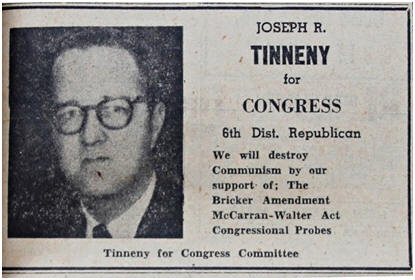
Among
other family members and friends, Joe recruited his nephews to
help put out campaign literature and otherwise help in the
campaign. The effort involved attaching posters to many
telephone poles throughout the neighborhood and the district and
giving out lots of little cards with his picture on them, which
announced his candidacy.
Hugh Scott won the Congressional seat and went on
to serve many years as the senior United States Senator from
Pennsylvania. Had Joe won, his plan was to have his godson
Richard Tinneny accompany him to Washington D.C. to serve as his
congressional page.
Joe also ran for Philadelphia City Council. Photo
of the campaign card used in his unsuccessful run for the 8th
District council seat. Courtesy R. J. Tinneny.
|
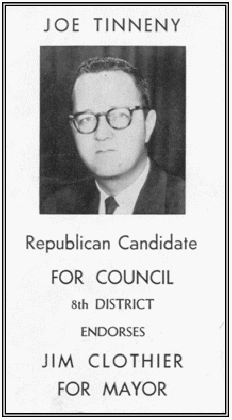 |
A mutual friend, Frank Taylor, introduced Joe to
his future wife Elizabeth “Betty” Smith at a cocktail party.
Although Joe didn’t know it, Betty had liked him from the time
she was a young girl. Betty was born October 20, 1926.
When they were first married, Joe and Betty lived
in an apartment at the top of Fountain Street in the Roxborough
section of Philadelphia. They later bought a home at 1231
Woodside Road in Conshohocken, Pennsylvania.
As adults most of Joe’s siblings lived in
Roxborough and Manayunk and he frequently got together with
them.
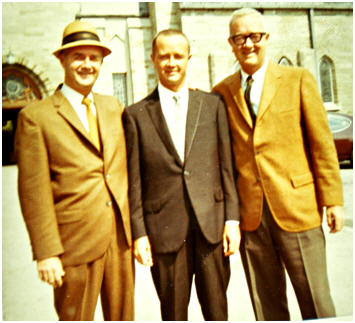
Joe with brothers Thomas far left and Donald.
Courtesy of Helen Tinneny.
Joe
died suddenly and unexpectedly of a massive heart attack in the
living room of his home on Friday November 22, 1974. He had an
appointment with his dentist that afternoon. He had been having
a pain in his jaw. He came home from work prior to the
appointment and took an Alka-Seltzer since he wasn’t feeling
well. He got up from the chair in the living room and collapsed
on the floor. Although the paramedics were summoned and quickly
arrived, Joe was pronounced dead on arrival at the local
hospital. He was 57 years old.
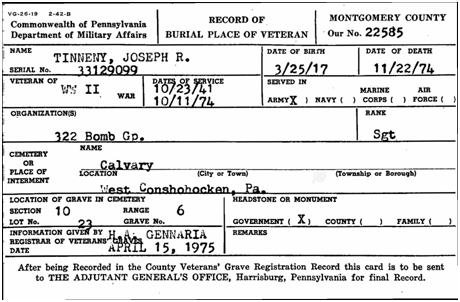
Pennsylvania Department of Military Affairs grave
registration card.
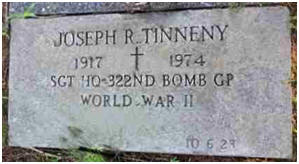
Photo: Joe’s grave marker, Calvary Cemetery.
Courtesy of
Karen Pecora..
There is a story associated with his grave
marker. When the initial cast bronze marker was delivered it was
found to have a misspelling. The defective marker somehow wound
up at the home of a family member of Betty’s in Philadelphia. At
some point, it was put out by the curb to be taken away in the
trash. Someone spotted it and gave it to Joe’s brother Jack. For
several years the plaque laid in a prominent spot beneath a tree
on his property not far from the dock. Years after Jack’s death
his wife Helen had one of their grandsons help dispose of things
and Joe’s marker was thrown into the river in front of the dock
at 18 ˝ River Road where it remains.
After Joe’s death Betty sold the house in
Conshohocken and moved into the home of a relative at 379
Fairway Terrace in Roxborough. Betty died of lung cancer on
October 11, 1989 and was buried with Joe at Calvary Cemetery.

|